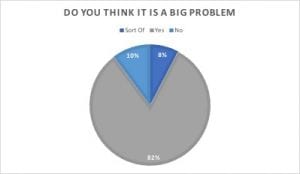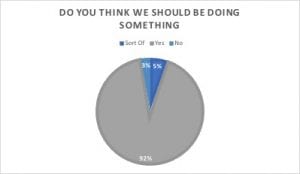UT students participate in climate change awareness survey
Climate change is something students worry about, so how should we approach it?

Thirty-nine random UT undergraduate students took a survey centered on climate change awareness. Three questions were asked: 1) Do you understand climate change? 2)Do you think it is a big problem? 3) Do you think we should be doing something about it?
According to the results, most students understand what climate change is, think it’s problematic and wish there was more being done about it.
Do you know about climate change?


Out of 39 students, 21 people claim to have an understanding of climate change, six do not and 12 people settle in-between. This brings the percentages to 54% who believe they have a good foundation of knowledge, 15% who do not and 31% who are in the middle.
According to the National Resources Defense Council, climate change is caused by a collection of carbon dioxide and other air pollutants – deemed greenhouse gases – in the atmosphere. Pollutants absorb sunlight and radiation that have bounced off the Earth’s surface instead of allowing them to escape into space. This creates a warmer atmosphere.
Skeptical Science explores the argument that global climate change is normal. Many people argue that rises and falls in climate are natural. There is a cyclic nature to the global climate, considering ice ages and historical warm periods.
However, there are external factors that cause natural energy shifters to increase or decrease at an unnatural rate. Humans release more than four times the amount of carbon dioxide emissions now compared to what they released in 1950. This has caused carbon dioxide concentration in the air to raise about 140% since pre-industrial America.
Along with carbon dioxide levels, solar output is another indicator of human-induced climate change. Satellites since the late 1970s have recorded the total energy output of the sun and reported that solar levels have slightly decreased. Yet instead of the earth cooling, it has warmed over this period of time. This is an indication that the atmosphere is absorbing more heat than it was in the 1970s.
NASA put together a list of organizations and their statements regarding climate change. 97% of climate scientists agree that humans are responsible for the spike in climate change in the last century.
As stated by the National Resources Defense Council, the largest source of air pollutants is the fossil fuel industry. It produces 2 billion tons of carbon dioxide each year. Coal-burning power plants are the biggest contributors, with transportation falling second in line.
Now you know about it, but is it a problem?


Out of 39 students, 32 think climate change is a big problem, four do not and three aren’t sure. This brings the percentages to 82% thinking it’s as a pressing issue, 8% don’t think it is and 10% are indifferent.
The National Resources Defense Council provided anticipated ideas of what global warming could cause. A few of these are melting glaciers, droughts and rising sea levels. These global changes could lead to water shortages and increase the risk of wildfires. Higher sea levels could mean coastal flooding.
Farmers and fishermen could face new difficulties with pests, heat waves and heavy rainfall. Habitats of animal species in colder climates and coastal waters could be disrupted causing possible extinction. A progressively worsening atmosphere could cause outbreaks of allergies, asthma and infectious diseases.
“Climate change is real, and I just hope people can listen to science. Every person is going to be impacted so if you chose to deny it now, you’re going to get to a point where you can’t deny it anymore. We need to take action today, instead of when entire cities are underwater, or diseases are so prevalent or fires happen all the time,” Kendall Wemberely, a UT student, said.
Wemberely, a senior studying climate science, has led one climate strike on campus that brought out several hundred participants. They made posters, chanted, gave speeches and then marched across campus.
It seems to be a problem, should we be doing something about it?


Out of 39 students, 36 think we should be taking action, one doesn’t and two are unsure. This brings the percentages to 92% thinking we should be proactive, three percent not and five percent not sure.
Over 90% of the students in the survey group agree we should be taking action to subside the damage we’ve caused. So, why isn’t more being done?
The Office of Sustainability for UT has taken a few measures. Since 2005, in-state students have paid about $10 and out-of-state students about $35 in tuition for green power and campus sustainability initiatives. These have included water bottle refill stations, solar power, renewable energy credits, new bike racks, recycling and conferences and workshops for students.
“Certain candidates aren’t supporting climate change, so if you’re supporting them, you’re contributing to the problem of inaction,” said Wemberely.
Not only can paying more attention to the initiatives of our politicians enact change, but there are personal, inexpensive measures people can take. Wemberely gives a few tips for people to consider when wanting to reduce their carbon footprint.
Wemberely discussed that people don’t usually think about their diet when it comes to climate change. The meat industry uses a lot of land and water to raise the animals we eat. Some animals also exert chemicals that are harmful to the environment. Red meat is the biggest food contributor to negative effects on the environment.
Edited by Maddie Torres and Libby Dayhuff
Featured image courtesy of Creative Commons

